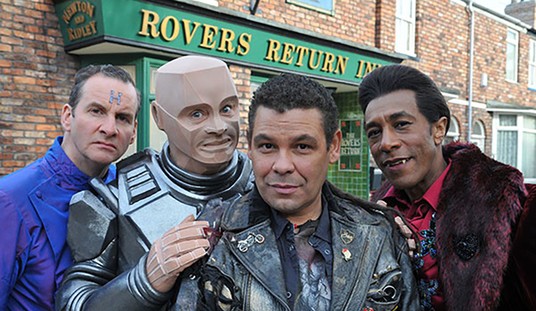RedState may seem like an odd place to write about the death of a union activist. However, the recent passing of Harry Kelber, a long-time labor activist, struck a personal chord with me.
You see, it was 20 years ago that Harry Kelber became one more straw that broke the camel’s back and, ultimately, helped change the course of my life.

In 1993, after spending nearly a decade in the union movement, I began writing my graduating paper for college. At the time, union decline was–as it is today–a hot topic and I set out writing my paper on the decline of unions and what, if anything, they could do to make a comeback.
The vast majority of my sources were from union sources: people from within the AFL-CIO and their member unions, books, academic papers and…Harry Kelber.
In his late 70s, Kelber, who had begun his union career in the late 1930s, was a tremendous source of information about the labor movement throughout much of the 20th Century. While I knew much of it through my own learnings in one union, as well as my studies, Kelber had lived it.
Kelber was a radical though. As a result, his forthright criticism of the union establishment caused him to be a constant pain in the backside of the cigar-chomping union bosses of then and now–all the way to AFL-CIO boss Richard Trumka.
Last year, for example, at the ripe old age of 98, Kelber announced he was running against Trumka for the presidency of the AFL-CIO.
My candidacy registers a firm belief that a vast majority of our members want the AFL-CIO to be a democratic organization, and they will join in the struggle to make it one — if they feel it can be done.
Yes, it can be done! AFL-CIO President Richard Trumka and his bureaucratic group have no plans to rebuild the Federation. They have a record of legislative failures. Trumka makes crowd-pleasing speeches, but he has avoided any direct action that will command the attention of either Congress or the White House.
Though Kelber stood no real chance at winning, he wasn’t running to win. He was running to have a debate about the labor movement’s future.
Ralph Nader responded to Trumka’s arrogant response at Kelber’s announcement [emphasis added]:
“Why should I listen to anything Harry Kelber says?” exclaimed a visibly indignant Richard Trumka, president of the AFL-CIO.
Maybe because Kelber, 98 years young, has been honestly fighting for labor rights as a worker, union organizer, pamphleteer, author, professor and overall hairshirt of the moribund organized labor movement for 78 years–or 15 years before Trumka, the former coal miner and United Mine Workers’ president, was born.
Though he had no chance of winning, Kelber wanted to be able to have a debate about the undemocratic processes within the AFL-CIO. He wanted his points heard and, although it was his last attempt at trying to reform the union movement, it certainly wasn’t his first.
In 2004, then-CWA boss Morton Bahr approved the expulsion of a 90-year old Kelber for his criticsm of Bahr’s involvement in the ULLICO scandal.
Kelber’s expulsion prompted union activist Mike Griffin to write [empahsis added]:
If the realm somewhere between slug slime and pond scum comes to mind, we are on a parallel thought path. The removal of DR. Harry Kelber from membership in Typographical Union Local 6, upheld by Communications Workers Of America [CWA] International Union President, Morton Bahr, is but another example of how desperate top labor leaders are to crush dissent and silence criticism, no matter how well deserved. Leadership so defunct and impotent, they can only rise to struggle against those in their membership who are defenseless against a misleadership willing to use their ill-gotten power and violate their own constitution to win at any cost.
In 1993, during one of several telephone interviews I did with Kelber, he shared his opposition to the autocracy of the union leadership. He shared how, when he was the Educational and Cultural Director for New York’s IBEW Local 3, he became critical of the union’s leadership and the way the union was being managed.
“What did they do?” I asked him.
“They fired me!” he said.
During the months of researching the decline of the union movement, for a young idealist discovering of the depths of the deception union bosses were perpetrating on their own members, Kelber’s words continued to haunt me.
While I discovered what, simply, labor could do to revive itself, I also came to realize that the union movement that Samuel Gompers, a man opposed to socialism while committed to workers and liberty, had been thoroughly corrupted and would not be reformed.
Unlike Harry Kelber, a man who devoted his entire life to reforming a movement that was led by leaders who refuse reform, I chose a different path.
Instead of fighting a futile battle as a union radical, as Harry Kelber did until the day he died, I chose to fight today’s unions. And, for that, I’ve earned the title “union buster” holding views (like freedom) that the Left deems “radical.”
I wonder though, if Samuel Gompers had lived to see what his movement had devolved to–how the socialists he so long opposed have thoroughly taken the movement over–would he too be considered a radical? A ‘wingnut’ for believing in freedom?
You see, although Harry Kelber believed in Big Government solving society’s (and labor’s) ills, Samuel Gompers did not. Gompers was distrustful of Big Government and rightly opposed the State regulating labor relations. Gompers believed in voluntarism–which is as it should be.
But, to today’s union bosses and their ideological allies on the Left, freedom is “radical kook” stuff.
Thank you, Harry Kelber, for helping me see just how corrupted the movement that Samuel Gompers built has become.
You helped change my life.
Rest in peace.
_________________________
“Truth isn’t mean. It’s truth.”
Andrew Breitbart (1969-2012)














Join the conversation as a VIP Member